Stephen Hayes's Blog, page 43
December 29, 2015
Racism and Christian healthcare
Last night we were returning home in the car after seeing friends and there was an interview on the radio with a bloke who ran an emergency paramedic outfit. He said he encountered a lot of racism in his work. When the paramedics were called out to the scene of an accident or something similar, some people were unhappy that the paramedics were black. They often assumed that they were not as qualified as white ones to do their job. He said this was a common response among white people, but sometimes they had the same response from black people that the paramedics had gone to help.
After we had been listening to this for while, my wife Val remarked that she could not have wanted better care than she had had from the black nurses at St Mary’s Hospital at KwaMagwaza in Zululand.
She had gone there for regular ante- and post-natal checkups when our two younger children were born, and that was over 30 years ago, during the apartheid period, when there was presumably more racial prejudice than there is now; in those days racial prejudice was not merely accepted, but expected. Government hospitals were segregated into black and white sections, “white” ambulances were not allowed to carry black patients and vice-versa.

St Mary’s Hospital, KwaMagwaza, 1980
On one occasion, in 1965, we had come across a scene of an accident — a bus had stopped outside a country store, and a child had run out from behind the bus to go to the shop, and a car coming the other way knocked him down. We phoned from the store to Dundee, the nearest town, and asked for an ambulance. When the ambulance arrived, the driver did not want to take the child — the ambulance was for whites and the child was black. So we asked, did he plan to leave the child lying in the dusty road while he went back to town and sent a “black” ambulance? Did he think it was a good use of the taxpayers’ money to make a double trip? Eventually, with much grumbling, he agreed to take the child. Back in those days, race mattered.
But to find such attitudes 20 years after the end of apartheid is an anachronism, to say the least.
St Mary’s Hospital was an Anglican church hospital, and that made it a bit different from government hospitals. It was built on land given to the church by King Mpande, in the days when Zululand was still independent, but after Zululand had been annexed to Natal following the Anglo-Zulu War of 1879 much of the surrounding land was given to white farmers, and so most of the patients are the hospital were black farm labourers who worked on the white-owned farms.
There was another Anglican Church hospital about 120 km to the north, the Charles Johnson Memorial Hospital at Nqutu. Nqutu was in a “Bantu Homeland”. I visited it a couple of times in 1965. It was run by a husband and wife medical team, Anthony and Maggie Barker, and they had developed it into a real Christian healing community. It was the sort of place one would like to be sick in.

Maggie and Anthony Barker, Charles Johnson Memorial Hospital, Nquthu, 1972
In those days there were many church hospitals, especially in rural black areas, run by a number of different denominations. I didn’t visit all of them, obviously, but those I did visit, though they certainly had their problems, had a similar spirit of Christian community, where white and black staff shared meals together, worked together and prayed together. Perhaps for this reason the National Party government nationalised all the church hospitals in the “Bantu homelands” in 1973. They did not want values alien to the apartheid ideology, like the notion of a Christian healing community, diluting their control.
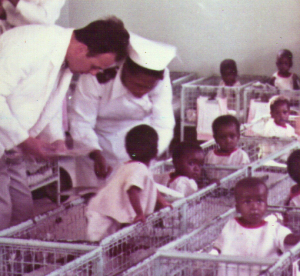
Charles Johnson Memorial Hospital, Nquthu, 1965
One result of this was that the nationalised church hospitals were faced with a critical staff shortage, and the quality of medical services in the rural areas plummeted. Many members of staff, especially the doctors and senior teaching nursing staff, were recruited by Christian agencies, and the people who applied to work in them saw it as part of their Christian ministry. They were prepared to work long hours at lower pay because they saw it as part of their Christian service, perhaps like the Anargyri of old. When the church hospitals were nationalised, the government could not recruit such people (and anyway one of the objects of nationalising the hospitals had been to get rid of them), so they had to resort to staffing the hospitals with half-trained medical students who had been conscripted into the army.
St Mary’s Hospital, KwaMagwaza, escaped this nationalisation for a while, because it was in a “white” area and not in a “Bantu homeland”. So it continued as a church hospital when we lived in the nearby village of Melmoth. And as Val said, she could not have wanted better care than she got from the black nurses at the hospital. We were planning for our children to be born there too, but one of them was somewhat overdue, and the medical superintendent said that they did not have the facilities to perform an induction of labour in case something went wrong, so he referred us to the government hospital in Eshowe, 60 km away. But that too was not lacking in Christian healthcare, even though the nurses were white; one was the wife of the Anglican dean, and the other was a Roman Catholic nun.

The Chapel at Charles Johnson Mem,orial Hospital, Nquthu, Zululand, in 1965, when it was still a church hospital
In saying this I’m not saying that Christian nurses are more competent than non-Christian ones, or that non-Christian nurses are incompetent. The point is that in the church hospitals that I knew the Christian community transcended apartheid, and that was why the government didn’t like them and tried to destroy them.
One of the white farmers of the Melmoth district was appointed to the board of St Mary’s Hospital, since many of the patients were farm workers, or members of their families, so the farmers had an interest in the hospital and its running. He was atheist/agnostic, but began to take an interest in the Christian faith and began asking for books to read on it, and started asking me questions about it. I was also a member of the hospital board, and I warned him that he must not expect Christians to be perfect — we had had a series of very difficult meetings of the hospital board, at some of which we had had to discuss sacking a senior member of the staff. But he said no, it was those very meetings of the hospital board that had convinced him that there must be something in the Christian faith, because they were so entirely unlike the secular business meetings he was used to attending. Yes, the issues were difficult, and the decisions hard, but the way that the board had gone around taking the decisions had greatly impressed him, and he was confirmed by the Anglican bishop of Zululand a few months later.
So if we could manage to look at black members of healing professions without racial prejudice in the 1970s and 1980s, when racism was politically correct, why can’t we do so today, when the apartheid ideology has been discredited and rejected?
Back then race mattered, because the government and its supporters thought it mattered, and they did their best to make sure that everyone else thought it mattered too. Surely people should have been disabused of that idea by now? Yes, there will always be a few hard-core racists who think that race matters, and will be like the ambulance driver who refused to take the black child in a “white” ambulance. But if an ambulance for anyone comes along, why get uptight about the race of the paramedics who have come to help? Just be thankful that somebody has come.


December 20, 2015
Something bad is happening in Burundi
Something bad is happening in Burundi. I learnt this from Tweets on Twitter, and from things friends post on Facebook.
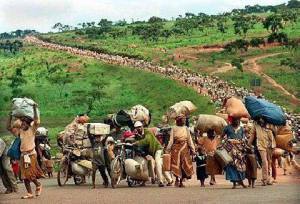 Yesterday I bought a Sunday newspaper, City Press, in the hope of learning something about what was going on. but they thought it was more important to tell me What celebs want for Christmas | City Press. From the picture people posted on Facebook, it looks like a refugee problem is developing there that is as bad as that in Syria.
Yesterday I bought a Sunday newspaper, City Press, in the hope of learning something about what was going on. but they thought it was more important to tell me What celebs want for Christmas | City Press. From the picture people posted on Facebook, it looks like a refugee problem is developing there that is as bad as that in Syria.
Of course one never knows with pictures like that on Facebook. For all I know it could have been taken 20 years ago in Rwanda, but by all accounts something bad is happening there, and whatever it is, the media are not telling us. For City Press it is far more important that we should read about Bonang, Pearl, in Revlon row. I think yesterday was the last time I’ll ever buy it.
I switched from the Sunday Independent to City Press because the former’s political reporting was all about personalities, and said nothing about policies. It was all about political infighting and jockeying for power among politicians, but said nothing about what those politicians actually stood for. It treated politics as a popularity contest, with the politicians as just another bunch of celebs, so that what they wanted for Christmas was more important than their principles or policies, if any. Now City Press seems to have deteriorated to the same level.
Perhaps I’ll go back to reading the Sunday Times.
I stopped buying the Sunday Times over 30 years ago, when they devoted three full pages to Sol Kerzner’s birthday party. But yesterday someone posted a link to a Sunday Times article that impressed me – SUNDAY TIMES – Behind Zuma’s U-turn: ‘SA will go bust’:
In those three days Zuma appeared to have lost his grip on the party and the country, with Deputy President Cyril Ramaphosa angrily telling his staff that he had nothing to do with Nene’s removal.
It has now transpired that, between Friday and Sunday evening, Zuma’s colleagues at Luthuli House took charge in a bid to avert the consequences of the worst political decision since the recall of former president Thabo Mbeki from office.
Even Zuma’s erstwhile comrades in the SACP and Cosatu turned on him, telling the president at a meeting held at his official residence, Mahlamba Ndlopfu, late that Friday that he would be “on your own” if he did not remove Van Rooyen.
One thing that interested me was that the article seemed to provide confirmation that what I thought might have happened had actually happened. That doesn’t count for much, really — reading news that conforms to my preconceptions and prejudices could just be reinforcing my delusions.
But something else impressed me too. As a language pedant, I was impressed that there was a journalist who knew the meaning of “transpire”. And if someone knows what “transpired” means, perhaps they also know what “refuted” and “suspects” mean. Just using those three words properly could take reporting to a whole new level of clarity and precision.
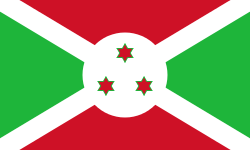 But having had my rant about journalism and the media, what about what is happening in Burundi?
But having had my rant about journalism and the media, what about what is happening in Burundi?
Well I don’t know much about that, so I’d better get back to Twitter and Facebook, because they are for sure telling me more about it than City Press did. Revlon, and the people who sell the stuff that celebs want for Christmas, take paid advertisements in the media. Burundian refugees don’t. That’s capitalism for you.


Gaudy Night
 Gaudy Night by Dorothy L. Sayers
Gaudy Night by Dorothy L. Sayers
My rating: 4 of 5 stars
This story, set in a fictional women’s college in Oxford in 1935, in some ways took me back to my student days, and in other ways made me conscious of how times have changed. The setting is similar to some of the Inspector Morse stories by Colin Dexter, but the times have changed, manners have changed, and crime novels have changed.
The Inspector Morse stories, like many modern crime novels, are police procedurals rather than whodunits. But in Sayers’s pre-war novel, the police don’t appear at all; It is all private investigators, and it is a true whodunit in that the reader is offered the same clues as the detective and is challenged to work out who the perpetrator was. In this case I found it pretty easy, and the chief suspect stood out as soon as the clue was revealed.
But the whodunit aspect was only a small part of the interest of the book, for me at least. This was the Oxford of the Inklings, the literary group that included some of my favourite authors, and it is said that Sayers moved on the fringes of that group herself.
I was a student in the UK (in Durham) about 30 years later, and that is now nearly 50 years ago. I don’t think it is just because I remember it that the 30 years between 1935 and 1965 seems much greater than that between 1965 and 2015. The academic concerns seem fairly similar, but the formality of manners present an enormous difference, In this book everyone, don and student alike, is referred to as Miss So-and-So. First names are hardly ever mentioned and I found that made it difficult to remember the characters and their roles. Thirty years later, we referred to everyone by nicknames. The Principal of the college was “the Prin”, the vice-pricipal was Brang, and one of the tutors was Piglet. So there seemed to be an enormous gulf between the students of the 1930s and those of the 1960s,
Another interesting thing about the book was the issue of feminism. Women’s colleges were still something of a novelty at Oxford, it seems, and there was quite a lot of discussion about the role of women, and the tensions between academic and family life. In part, this was dictated by the plot, and the choices faced by the protagonist Harriet Vane, and it turned out to have more to do with the plot in the end, but there was also the 8-year-old girl who wanted to ride and repair motorbikes when she grew up,
So it was an interesting book in many more ways than just a novel of crime detetction.
KIt is also interesting


December 9, 2015
How reading the Bible turned me into a Liberal
Someone posted a link to an article about a study that showed that reading the Bible is likely to make people support liberal political policies. I can testify to that from my own experience.
Warning: Actual Bible Reading Likely To Turn You Into A Liberal, Study Shows :
Christian researchers have discovered the existence of a book that is so dangerous to conservative ideology, Republicans may soon decide to ban it altogether. Strangely enough, that book is the Christian Bible.
According to a study published in Christianity Today, people who say they read the Christian Bible frequently are far more likely to support liberal policies, when compared to those who read the Bible less often.
I grew up in a home where we had a Bible that no one read. We never went to church, and my parents were atheist/agnostic. At the age of 10 I knew more about Islam than about Christianity; an aunt had given me a book for Christmas, King of the Wind, the story an Arabian stallion who became the ancestor of English racehorses. From reading it I knew about the fast of Ramadan, but I’d never heard of Lent. When we went back to school after the Christmas holidays I excitedly told a friend that the best book in the world was King of the Wind, and he rather prissily retorted “The best book in the world is the Bible.” I responded “This book is also holy,” because it made quite a lot of mention of Islamic practices, and that was about as far as my concept of holiness went then.
 The following year I went to a Methodist school (St Stithians College) and so we were issued with a “Children’s Bible”, an abbreviated version, with all the boring and salacious bits omitted. The maths teacher taught the “Scripture” class, and his method was simply to get us to read aloud in turn from the children’s Bible we had been issued with, while he got on with marking our maths and physics homework or setting exam papers. I was quite taken with the story, and started reading ahead. I decided I didn’t want the abbreviated version and wanted the whole thing, and surprised my parents by asking for a Bible for my birthday, which I read over the next year. By then I had discovered that that too had been bowdlerised, and wanted one that included the so-called Apocrypha. So I read that too.
The following year I went to a Methodist school (St Stithians College) and so we were issued with a “Children’s Bible”, an abbreviated version, with all the boring and salacious bits omitted. The maths teacher taught the “Scripture” class, and his method was simply to get us to read aloud in turn from the children’s Bible we had been issued with, while he got on with marking our maths and physics homework or setting exam papers. I was quite taken with the story, and started reading ahead. I decided I didn’t want the abbreviated version and wanted the whole thing, and surprised my parents by asking for a Bible for my birthday, which I read over the next year. By then I had discovered that that too had been bowdlerised, and wanted one that included the so-called Apocrypha. So I read that too.
So much for the Bible, what about being liberal?
At the time that I began reading the Bible, the Liberal Party of South Africa was formed. One day, riding a horse through the Johannesburg suburb of Sydenham, I saw a house with a banner outside, Liberal Party of South Africa, it read. When I got home I asked my parents what “liberal” meant, and they explained that it meant “loving freedom”. I thought that was a good thing, though I did not, at that time, connect it with the Bible.
Over the next few years in South Africa the defining characteristic of liberalism came to be universal suffrage, defined as “one man, one vote”. Liberals believed in one man, one vote, non-liberals didn’t. It was as simple as that.
Then I got diverted by reading a novel by Nevil Shute called In the wet. In it he described a political system of multiple voting. It was a system of universal suffrage, in that it gave everyone a say in the government, but some people got more say than others on the basis of education, entrepreneurship and the like. It answered a common criticism of democracy — that it’s no use counting heads if you take no account of what’s in them. It proposed a form of meritocracy instead.
In the general election of 1958 I urged my mother to vote for the Liberal Party candidate. I don’t know if she did, but anyway he lost. In 1959 the Progressive Party was formed, advocating a qualified franchise, with people being allowed to vote on the basis of education or wealth. In 1960 the last black voters in South Africa lost the right to vote. I was persuaded by a friend to join the Progressive Party, and became active in the Houghton branch of the Young Progressives, working for the re-election of Helen Suzman, one of the founding members, and the only one to retain her seat in the 1961 white election, where no blacks voted (when blacks had been allowed to vote, they voted mainly for liberals and communists).
In 1960 I was also a youth delegate to the Progressive Party congress, where they debated their franchise policy. The Molteno Commission proposed a minimum educational level of Standard 5 (Grade 7), or a minimum annual income of R600 (about R60000 in today’s money). I stood up and quixotically urged the multiple voting system, saying that everyone should have some say in the running of the country. My elders and betters looked at me like something that had crawled out of the cheese, no doubt thinking to themselves “Who is this scruffy beatnik, with his weird ideas?” The other Young Progressive delegate next to me, pink and plump and smooth, and wearing a three-piece suit, stood up to propose an even higher qualification, than that proposed by the Molteno Commission, saying that only responsible people should be allowed to vote. The elders and betters nodded sagely and murmured “What a nice responsible young man. He will go far.” And it began to dawn on me that the Progressive Party was a bourgeois party, and that if it only gave votes to the rich and educated, it would mainly be supported by the rich and educated. It had good people in it, like Helen Suzman, but the people who made the policy were those who had the good fortune to be wealthy and educated. And back in 1960 those were mostly white.
I went to university and majored in Biblical Studies, and so had to read the Bible with more attention than previously. The stories of Jael and Sisera, and Judith and Holofernes — brave women who toppled oppressive rulers — had not been lost on me. But the more I read the Bible, and the more deeply I studied it, the more I came to realise why oppressive rulers needed to be toppled. And I realised that wherever Nevil Shute’s idea of multiple voting came from, it did not come from the Bible.
The Bible told me that all have sinned and fall short of the glory of God. And that did not apply just to Jews and Greeks. It applied equally to the poor and the rich, the black and the white. No one was intrinsically better qualified to rule than anyone else, whether by race, wealth or education.
G.K. Chesterton put it rather well:
This is the first principle of democracy: that the essential things in men are the things they hold in common, not the things they hold separately. And the second principle is merely this: that the political instinct or desire is one of these things which they hold in common. Falling in love is more poetical than dropping into poetry. The democratic contention is that government (helping to rule the tribe) is a thing like falling in love, and not a thing like dropping into poetry. It is not something analogous to playing the church organ, painting on vellum, discovering the North Pole (that insidious habit), looping the loop, being Astronomer Royal, and so on. For these things we do not wish a man to do at all unless he does them well. It is, on the contrary, a thing analogous to writing one’s own love-letters or blowing one’s own nose. These things we want a man to do for himself, even if he does them badly. I am not here arguing the truth of any of these conceptions; I know that some moderns are asking to have their wives chosen by scientists, and they may soon be asking, for all I know, to have their noses blown by nurses. I merely say that mankind does recognize these universal human functions, and that democracy classes government among them. In short, the democratic faith is this: that the most terribly important things must be left to ordinary men themselves — the mating of the sexes, the rearing of the young, the laws of the state. This is democracy; and in this I have always believed.
So as a result of reading the Bible I came to believe that “one man, one vote” was the only biblically tenable system of voting, and in the South Africa of those days, believing in “one man, one vote” was the distinguishing mark of a liberal. So I became a liberal. I also became a Liberal, and joined the Liberal Party. And I went around to political meetings preaching speaking on biblical texts like Proverbs 29:2 When the righteous are in authority, the people rejoice, but when the wicked rule, the people groan.
And if the people have the right to vote, then they have the means of tossing out the wicked rulers, for A rich man is wise in his own eyes, but a poor man who has understanding will find him out (Proverbs 28:11). And if the poor man has the vote, not only can he find him out, he can vote him out. And it was to preclude that very thing that South Africa’s ruling class excoriated one man, one vote as the worst of all possible evils. They didn’t even see the need to explain what was wrong with it, it was self-evident to them and their supporters.
So the Bible made me a liberal, and I’m glad to see that I’m not the only one.


December 3, 2015
Akathist Hymn for St Nicholas of Japan
Kontakion 1
Chosen from the people of Russia to bear the glad tidings of Christ to the land if Japan, you laid down thy life for your fathers, strengthening them in the true faith.
Revering your deeds, we praise you thus:
Rejoice, O Nicholas, equal to the apostles, defender of the Church of Japan!
Ekos 1
An angel accompanied you, like Tobias of old, when in your youth you directed your steps to this remote land. Therefore we cry unto you thus: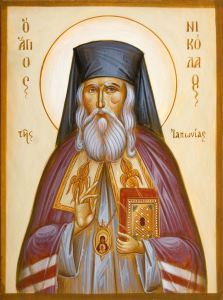 Rejoice, glorious child of the land of Smolensk!
Rejoice, glorious child of the land of Smolensk!
Rejoice, you who loved the Church from your infancy!
Rejoice, you who were not abandoned by the Mother of God in your orphanhood!
Rejoice, you who grew wise in spiritual wisdom!
Rejoice, you who foreknew your path at an all-night vigil!
Rejoice, you who defied worldly delights
Rejoice, you who were made worthy of both monkhood and priesthood!
Rejoice, you who craved for preaching the Gospel!
Rejoice, you who were full of compassion for those ignorant of salvation!
Rejoice, you who loved people far equally to those near!
Rejoice, you who did not fear persecutions!
Rejoice, O Nicholas, equal to the apostles, defender of the Church of Japan!
Kontakion 2
Beholding the deeds of Saint Innocent, the divinely wise enlightener of Siberia and Alaska, the righteous youth yearned to pursue his path, crying:
Alleluia!
Ekos 2
You appeared wise and humble, O holy one, in praying to the Lord for the gift of tongues: “How shall I preach to people strange, how shall I open my inexpert lips?” Hearing you God-loving words, as you instructed your flock in their native tongue, we praise you thus:
Rejoice, you who triumphed in the love of Christ!
Rejoice, you who guided spiritual infants!
Rejoice, you who turned your adversaries into your children!
Rejoice, you who washed their sins away by baptism!
Rejoice, you who strengthened faith by knowledge!
Rejoice, good and caring guide!
Rejoice, ordainer of Japanese presbyters!
Rejoice, establisher of the Church order!
Rejoice, defender of all the faithful!
Rejoice, proponent of brotherly concord!
Rejoice, champion of the Orthodox faith!
Rejoice, O Nicholas, equal to the apostles, defender of the Church of Japan!
Kontakion 3
The power of the Highest overshadowed and strengthened you, O father, when you came to a pagan land that put its children to death for receiving baptism. And you, discerning a field of God, cried:
Alleluia!
Ekos 3
Having sincere love, you regarded this land as a bride adorned, awaiting for the bridegroom at the marriage feast, as she had known betrothal, being covered in blood of the martyrs of old, being brightened by the elders and women crucified, and by the children who professed their faith in Christ. Revering your just hope, we praise you thus:
Rejoice, holy one of the Spirit!
Rejoice, strengthened by the power of the Cross!
Rejoice, steadfast pillar!
Rejoice, fearless pastor!
Rejoice, undaunted mind!
Rejoice, unceasing preacher!
Rejoice, you who judged no one!
Rejoice, you who were not judged!
Rejoice, fellow of the confessors!
Rejoice, true man of prayer!
Rejoice, dear one of your guardian angel!
Rejoice, O Nicholas, equal to the apostles, defender of the Church of Japan!
Kontakion 4
Seeing how the Church was being built, servants of idols raised a storm, unable to brook the Christian spirit. But you, rejoicing in the patience of your children imprisoned in dungeons, cried together with them:
Alleluia!
Ekos 4
Hearing that the teaching of Christ embraces all nations and accepts them equally, and that the Lord prepared many mansions for them, men and women, children and elders came to you, O good pastor. Therefore we praise you thus:
Rejoice, you who gathered a small flock of Christ!
Rejoice, you who lead them to God by the narrow path!
Rejoice, you who followed the example of the church of Aquila and Priscilla!
Rejoice, you who established house churches!
Rejoice, you who blessed agape meals!
Rejoice, you who never abandoned your children in distress!
Rejoice, you who consigned weak children to the care of strong ones!
Rejoice, you who supported the weak with your fatherly hand!
Rejoice, you who sowed wisely the field of Christ!
Rejoice, you who built the Church on the firm rock!
Rejoice, diligent servant who never hid his talent!
Rejoice, O Nicholas, equal to the apostles, defender of the Church of Japan!
Kontakion 5
You appeared as a divinely-moving star of God, O father, zealously serving the Sun of Justice and guiding the faithful to the Lord like the star of Bethlehem in the old days. Clothed in the Light you bore, we cry to Christ:
Alleluia!
Ekos 5
Seeing pagan shrines and Buddhist pagodas, the righteous one wept and prayed: “Where shall I build a Church for Thee, O Lord?”, and the prayer of his heart was heard.
Rejoice, as the deer on the water brooks!
Rejoice, you who erected the temple of Resurrection of Christ!
Rejoice, you who reared the Cross above the capital city!
Rejoice, you who made the bells toll to Heaven!
Rejoice, you who extinguished the fire of Christian persecutions!
Rejoice, you who acquired a good name among the Japanese people!
Rejoice, you who did not offend the ancient customs!
Rejoice, you who became a friend and a brother of the Japanese nation!
Rejoice, God-sent bearer of the Light!
Rejoice, faithful steward of the Lord!
Rejoice, now crowned with heavenly glory!
Rejoice, O Nicholas, equal to the apostles, defender of the Church of Japan!
Kontakion 6
Preachers of the Holy Gospel rejoice in their heavenly abodes, greeting you as their fellow. And we, your earthly family, beholding such grace, sing to God:
Alleluia!
Ekos 6
Having first shined in the land of Smolensk, you now join All Saints of the Russian land: behold Saint Demetrius of Rostov, a melodious flute of the Spirit; behold Saint Tikhon, the pride of Zadonsk, a gatherer of the treasures of wisdom; behold Saint Stephen, the enlightener of Perm; behold Saint Sergius, Zosimus, and Sabbatius of the Solovki, a consolation of Russia,; behold all the Saints, both hidden and disclosed, the Divine Light of your fatherland. And we, full of great joy, praise the new Saint:
Rejoice, son of a country deacon!
Rejoice, you who had known indigence from childhood!
Rejoice, you who made the vow of poverty!
Rejoice, you who kept your monastic vows till death!
Rejoice, bishop who many times mended vestments!
Rejoice, you who dwelled in humble huts!
Rejoice, you who never sought worldly things in the world!
Rejoice, guide of the new converts!
Rejoice, baptizer of the Ainu fishermen!
Rejoice, you who reached the utmost lands!
Rejoice, you who reared fellow champions in your school!
Rejoice, O Nicholas, equal to the apostles, defender of the Church of Japan!
Kontakion 7
Preparing to depart from earth into heaven, the blessed one said: “What do I need this body for, tormented by illnesses, if I cannot labour for the Lord? I leave this bodily temple, crying:
Alleluia!”
Ekos 7
There was a new feast in the capital city of Japan: the Saint celebrated Easter at the cathedral in Tokyo, and the Japanese people got to know the true Pascha of salvation. And we, remembering that day, cry loudly:
Rejoice, you who preserved love in a cruel epoch!
Rejoice, governor of the feast of the Church!
Rejoice, elder of unslumbering eyes!
Rejoice, father, greeting your children with a kiss!
Rejoice, you who set forth your children before the Lord!
Rejoice, you who won the grace of the Spirit by daily labours!
Rejoice, you who saw the fruits of your efforts at your departure!
Rejoice, you who threw a mustard seed into the earth!
Rejoice, you who left us a beautiful tree!
Rejoice, living bridge of the Christian world!
Rejoice with angelic joy at the day of your Lord’s Resurrection!
Rejoice, O Nicholas, equal to the apostles, defender of the Church of Japan!
Kontakion 8
Beholding a strange wonder, as Japanese children of Christ served Russian war prisoners as their brothers, we sing a song to the Lord:
Alleluia!
Ekos 8
You gave yourself over to the service of God, and also served people incessantly, combining both commandments. Admiring your royal road, we praise you thus:
Rejoice, wise servant of God!
Rejoice, you who offered the priestly sacrifices for the nations!
Rejoice, protector of Russian war prisoners!
Rejoice, you who did not abandon your children in the war storm!
Rejoice, you who remained loyal to your native country!
Rejoice, teacher of mercy and courage!
Rejoice, you who led tempted souls to chastity!
Rejoice, refuge of the outcast!
Rejoice, treasure of humbleness!
Rejoice, abode of repentance!
Rejoice, love invincible!
Rejoice, O Nicholas, equal to the apostles, defender of the Church of Japan!
Kontakion 9
Every tree is known by its fruit, and your great labour bore the fruit of salvation for many people. Therefore we cry:
Alleluia!
Ekos 9
Most eloquent orators are amazed at your deeds, angels rejoice with you. And we, beholding your humble life and mighty patience, praise you thus:
Rejoice, you who laboured zealously not in ancient times, but in our days!
Rejoice, worthy image of an Orthodox archpastor!
Rejoice, profound exposure of our sins!
Rejoice, sinless confession of Christ!
Rejoice, true measure of prudence!
Rejoice, treasure gathered in the Spirit!
Rejoice, treasure spent for one’s neighbours!
Rejoice, you who are repaid a thousandfold!
Rejoice, full of immortal joy!
Rejoice, you who appease our agonies!
Rejoice, you who accept our prayers with fatherly love!
Rejoice, O Nicholas, equal to the apostles, defender of the Church of Japan!
Kontakion 10
You set out to save desperate people, ignorant of the One True God. Now your children, who saw great light in the region and shadow of death, cry to the Lord:
Alleluia!
Ekos 10
“Thou art our bulwark, O Holy Virgin!”, prayed the Saint fervently amidst his labours, establishing the Church. It stood unshielded among the Gentiles, as on a storm-swept island. And we, beholding its fortitude and fidelity, cry to you thus:
Rejoice, you who shielded your Church with secure protection!
Rejoice, you who committed the converts to the Virgin Mother of God!
Rejoice, you who taught maidens to pray!
Rejoice, you who led them to the light of chastity!
Rejoice, you who blessed Japanese families and consecrated their marriage bonds!
Rejoice, holy mirror of true judgments!
Rejoice, you who brought peace to villages and cities!
Rejoice, you who found strength in faith amidst troubles!
Rejoice, you who supported your elderly father until his death!
Rejoice, you who lived in the world, but remained free from the world!
Rejoice, you who were mourned by all at your decease!
Rejoice, O Nicholas, equal to the apostles, defender of the Church of Japan!
Kontakion 11
Every hymn is defeated that tries to encompass your apostolic service, O Saint, and together with you we say:
Alleluia!
Ekos 11
The Church of Japan received the light of good tidings in its native tongue, owing that to your labour, O true enlightener. You followed in the footsteps of the Ecumenical Teachers, using your wisdom-loving mind to serve the heavenly wisdom. Revering your good deeds, we praise you thus:
Rejoice, you who cognized the Holy Scripture!
Rejoice, you who passed it on to the children of men!
Rejoice, you who found the worthy words!
Rejoice, you who rejected the wrong and false ones!
Rejoice, you who perceived your efforts as a common work of the Church!
Rejoice, you who peacefully reposed from your labours!
Rejoice, you who brought the Word close to the people!
Rejoice, you who gave the Japanese Church the Divine Worship in its native tongue!
Rejoice, you who discarded every sophistication!
Rejoice, you who nourished your children with milk and honey!
Rejoice, you who humbled the pride of the hypocrites!
Rejoice, O Nicholas, equal to the apostles, defender of the Church of Japan!
Kontakion 12
The grace abided in you, revealing the holiness of your service. Even though you never performed miracles, just as St. John the Baptist never did, your all-surpassing evidence is the new Church, established by the miraculous power of God in our days. Together with it we sing with one heart:
Alleluia!
Ekos 12
Singing your glorification, as your name is included among the Saints, O brother and pastor, we praise you thus:
Rejoice, you who established the Church in our days by your holiness!
Rejoice, relief from earthly sorrows!
Rejoice, gentle blowing of the grace!
Rejoice, helper of those who fled unto you!
Rejoice, co-partaker of spiritual labourers!
Rejoice, good gardener and flower-keeper!
Rejoice, you who remedy our discords!
Rejoice, you who meet your children in the heavenly abodes!
Rejoice, you who commemorate those who commemorate you!
Rejoice, calmer of the stormy seas!
Rejoice, star of the Occident and the Orient!
Rejoice, O Nicholas, equal to the apostles, defender of the Church of Japan!
Kontakion 13
O most holy and most wonderful, most glorious and most marvellous enlightener of the land of Japan, constantly praying for us before the throne of the Holy Trinity, Saint Father Nicholas, equal to the apostles! Accept our present offering and entreat our God the Saviour and His Holy Virgin Mother that through your intercession He may illuminate with the light of Orthodoxy the nations you enlightened and our own country, and that He may deliver us from every assault of our enemies visible and invisible, from bane and temptations, misfortunes and distresses, and grant us forgiveness of sins and deliverance from the eternal death, and make us worthy of the Kingdom of Heaven, that together with you and all the Saints we may sing to the Holy Trinity unto ages of ages:
Alleluia!
Prayer
O all-praised Mother Who didst lead Saint Nicholas, equal to the apostles, to the remote land of Japan to preach the Word of Thy beloved Son! Behold, Our Lady, he executed Thy will. Stretch Thy blessing hand towards Thy servants, children of those whom he converted, and towards us, abiding in our sins, that through his prayers we may preserve the Orthodox faith unto the ages of ages. Amen.


November 29, 2015
Liturgical reform, ecumenical visits and more
One of the unintended consequences of liturgical reform in the Anglican Church is that most of the traditional Anglian prayer books are out of print. This may not bother most Anglicans, since they use the revised service books, and the Anglican Church holds the copyright on the old and new versions, and see no particular reason to reprint books that nobody is using. What many may not be aware of is that the old Anglican Book of Common Prayer is in fact widely used by many different denominations that have inherited something of the Anglican tradition, but they can no longer buy copies.
This struck me forcibly today when we visited the African Orthodox Church in Atteridgeville, where the service was led by Deacon Enock Thobela. He showed me an exceedingly battered and worn copy of the Book of Common Prayer in Southern Sotho, and asked where he could get copies for the congregation, who had to sing the canticles from memory.
The service was traditional Anglican Mattins, and on the way home we found ourselves humming the tune of the Te Deum, and then wondering if we would see missiles flying around the sky, as it reminded us of the Tom Lehrer song
We will all char together when we char
And let there be no moaning of the bar
Just sing out a Te Deum when you see that ICBM
And the party will be “come as you are”.
But, on a more serious note (though what could be more serious than global thermonuclear war, which seems more likely now than at any time since the 1960s, when Tom Lehrer composed the song), I wonder if the people responsible for the publication (or non-publication) of such prayer books realise that they are probably used by far more people than they know. There is an Anglican “family” of African Independent Churches, where such books are still in demand.
One thing that strikes me is that in this part of the world the services are almost always in Southern Sotho, though most of the people in the congregation speak Northern Sotho, Tswana and other languages. Perhaps this is one of the parts of Orthodox tradition that has reached the (non-canonical) African Orthodox Church. South Sotho probably bears as much relation to North Sotho and Tswana as Church Slavonic does to modern Russian or Bulgarian, or Church Greek does to everyday spoken Greek.
I have a theory about why Southern Sotho is favoured as a liturgical language. The first Christian missionaries in this part of the world came from Lesotho, and spoke Southern Sotho, and they brought a hymn book with them, Lifela tsa Sione (Songs of Zion), which is, like the Anglican Book of Common Prayer widely used by many different denominations. So I think those early BaSotho missionaries left their mark — their language is regarded as a holy language, and most suitable for church services. Try to change it and you will probably get the same arguments as you would to proposals to replace Church Slavonic with modern Russian or Serbian, or Church Greek with Demotic Greek.
So if anyone reading this has a copy of the Anglican Book of Common Prayer in Southern Sotho that you don’t need, please send it to us, and we will pass it on to the African Orthodox Church in Atteridgeville, where it would really be apprecviated.
One reason for our visit was to ask if we could use the African Orthodox Church for our services. Their service starts at 10:30, so if we started at 9:00 we could be finished without interfering with their service, and we could make a contribution to their expenses — electricity bills and the like. Their church council will discuss it and let us know.

At the African Orthodox Church in Atteridgeville. Val Hayes, Artemius Mangena, Demetrius Mahwayi and friend, Deacon Enock Thobela of the AOC
We have visited before, and have always found the people of the African Orthodox Church very friendly and welcoming. You can read about an earlier visit here, where there are more pictures of the church.
On the way home we saw lots of trees with yellow flowers in bloom. I always thought the jacarandas were the last fling of spring, but these ones are later still. They seem more noticable this year than in previous years, somehow.

Spring’s last fling


November 28, 2015
Why I am Not Anti-Muslim | A Pilgrim in Narnia
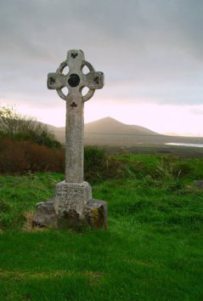 The result of this fuzzy thinking in culture is that while millions face dislocation, cold, and hunger as they flee a region destabilized by the post-9/11 war on terror, there is a gut-level reaction against Muslims. Some respond by reminding folk that the refugees are the victims of Islamist extremism, not the perpetrators. Others remind us that 1 in 6 of the refugees are Christians and other minorities that have faced generations of oppression.
The result of this fuzzy thinking in culture is that while millions face dislocation, cold, and hunger as they flee a region destabilized by the post-9/11 war on terror, there is a gut-level reaction against Muslims. Some respond by reminding folk that the refugees are the victims of Islamist extremism, not the perpetrators. Others remind us that 1 in 6 of the refugees are Christians and other minorities that have faced generations of oppression.
Source: Why I am Not Anti-Muslim | A Pilgrim in Narnia
Recommended reading.
In the last few weeks I have seen people who claim to be Christians saying quite vehemently, in a strange inversion of Christian values, that it is morally wrong not only to give shelter to refugees, but even to speak of doing so.
In South Africa we have seen outbreaks of xenophobia and xenophobic violence in recent years. Some of the foreigners who have been attacked have been refugees, others have been economic migrants, but it is often hard hard to tell the difference. Many Somalis have fled from a country torn by civil war over the last few years, as Syria has been. But they have been attacked in South Africa.
Many Zimbabweans are economic migrants, but where do you draw the line? The Zimbabwean government engaged in military adventures in the Congo civil war. This depleted Zimbabwean foreign exchange reserves, leading to a fuel shortage. The fuel shortage damaged the economy, leading to job losses, especially in the cities. The urban workers, who had been most affected by this, formed an opposition party which gained a lot of electoral support. To prevent this support from spreading to the rural areas, the ZANU-PF government seized land from commercial farmers and distributed it to their supporters, which depressed the economy still further. Zimbabwe had to import crops that it had previously exported. In addition opposition supporters were beaten up, and sometimes killed and threatened. Many of them fled to South Africa. Some were fleeing because of direct threats to their lives, others because of the decline in the economy, and some because of both. War and violence tends to disrupt economies, and so people flee for both reasons, and the reasons are intertwined.
And Zimbabwe’s loss was South Africa’s gain. Zimbabwe never suffered from Bantu Education or anything like it, and hundreds of well-qualified teachers came to South Africa. We had a good opportunity to fix our broken education system, but because of xenophobia we failed to make use of it.
So even from a practical, secular point of view, it can make sense to welcome refugees.
But in the Christian faith welcoming refugees is a moral duty, even when we can see no economic advantage in doing so. Yet some argue that it is immoral to say that.


November 27, 2015
A MEDITATION: ST MICHAEL AND ALL ANGELS: seraphimsigrist
November 8 in the East of Christianity is the day of St Michael and all the angels, corresponding to Michaelmas in the West on September 30. Angel means messenger. A messenger brings a communication from one to another and the more accurately he transmits it the better of course. So in old days…
Source: A MEDITATION: ST MICHAEL AND ALL ANGELS: seraphimsigrist


November 20, 2015
Whose lives matter?
A few months ago I began to see people posting things on social media sites like Facebook and Twitter saying that it was wrong to say that “All lives matter”.
Now I know that many people do not believe that all lives matter (I’m talking about human lives here). Many people divide the human race into “us” and “them”, and believe that “our” lives matter more than “their” lives. Some speak about the cost of this or that action in terms of “American lives” or “British lives” or “Jewish lives”, as if these lives were more important than other lives. I think we all have that tendency. I know that the death of someone I know and love affects me more than the death of a complete stranger.
But where it gets weird is when people start giving different values to different groups of strangers, and not in relation to death as such, which happens to all of us, but death at the hands of other people. I’m not just talking of dying here, but of killing, or hastening the death of someone by some deliberate human act. And it is in that context that I say “all lives matter”. And it is in that context that I find it very strange when people say that it is wrong to say that all lives matter.
Over the last couple of years there have been a number of news reports of police in the USA assaulting and sometimes killing unarmed people, usually young people, and a disproportionate number of those young people were black. So people came up with the Twitter hashtag #blacklivesmatter, because they believed, not without reason, that many policeman believed, or acted as though they believed, that black lives mattered less than white lives. I preferred to use the hashtag #policebrutality for such incidents, because I believe that all lives matter. I have already blogged about that here, so before anyone starts explaining to me that I don’t understand the context, please read that. And please read what follows to understand why I say I believe that “all lives matter”, and why it is important.
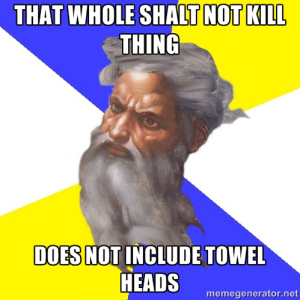 If you Google the phrase “all lives matter” you will find that a lot of people, especially in the USA are saying that it is wrong to use that phrase. But they generalise it outside their own particular context, and some of the people who were saying that it was wrong were not in the USA, but in Britain and elsewhere. I believe that those who say that it is wrong to use that phrase have lost not only their moral compass, but also their reason. Unless, of course, you really believe it. Then you may have lost your moral compass, but your reason is intact. If you believe that Syrian or Afghan lives matter less than American lives, then obviously you won’t believe that all lives matter, and you might have a good reason for thinking that the only good Syrian refugee is a dead one.
If you Google the phrase “all lives matter” you will find that a lot of people, especially in the USA are saying that it is wrong to use that phrase. But they generalise it outside their own particular context, and some of the people who were saying that it was wrong were not in the USA, but in Britain and elsewhere. I believe that those who say that it is wrong to use that phrase have lost not only their moral compass, but also their reason. Unless, of course, you really believe it. Then you may have lost your moral compass, but your reason is intact. If you believe that Syrian or Afghan lives matter less than American lives, then obviously you won’t believe that all lives matter, and you might have a good reason for thinking that the only good Syrian refugee is a dead one.
But my use of all lives matter goes back quite a long time before that.
Soon after the end of apartheid and South Africa’s first democratic elections, white people who longed for the “good old days” of apartheid began speaking of “white genocide” and propagating the idea that the murder of white farmers by armed robbers was evidence of such genocide. It seemed pretty clear from the way in which they told these stories that the aim was to to show that they were right all along — if you give blacks political power, there will be a bloodbath and “they” will kill all the whites. In view of the obvious political motive, it is difficult to know whether the figures they give are accurate, or exaggerated for the purposes of political propaganda.
What did happen in the 1990s, however, was a dramatic increase in the crime rate.
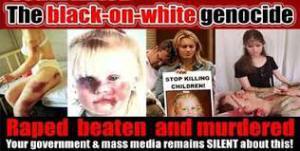 That also happened in other countries that also made a transition from authoritarian rule to democracy in the same period, the Second-World countries of the former Soviet bloc. So it seems that more freedom meant more crime. Does that mean that we should go back to more authoritarian societies and give up our freedom?
That also happened in other countries that also made a transition from authoritarian rule to democracy in the same period, the Second-World countries of the former Soviet bloc. So it seems that more freedom meant more crime. Does that mean that we should go back to more authoritarian societies and give up our freedom?
In South Africa, as in other former authoritarian countries, the police were trained in detecting and neutralising perceived threats to the security of the state rather than catching criminals. One South African newspaper cartoon of the 1960s had two burglars with their loot watching a policeman passing by, and one said to other, “Don’t worry about him, he’s looking for integrationists.”
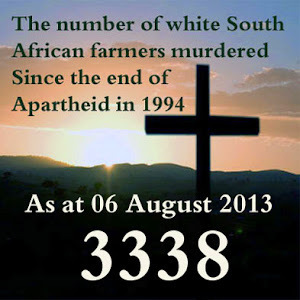 The lifting of economic sanctions against South Africa in that period opened the way for increased foreign trade, but it opened the way not only for legitimate businesses, but for crooked businesses as well, and crime syndicates from all over the world opened branches in South Africa, triads from Hong Kong, the Italian and Russian mafia, you name it. Nigerian drug dealers and Bulgarian car thieves poured in, looking for easy pickings. And the South African police couldn’t cope. They weren’t trained for such things. In addition, the apartheid government had had dealings with a lot of shady businesses for the purposes of sanctions busting, and the new government didn’t need them, so they had to look elsewhere for their profits.
The lifting of economic sanctions against South Africa in that period opened the way for increased foreign trade, but it opened the way not only for legitimate businesses, but for crooked businesses as well, and crime syndicates from all over the world opened branches in South Africa, triads from Hong Kong, the Italian and Russian mafia, you name it. Nigerian drug dealers and Bulgarian car thieves poured in, looking for easy pickings. And the South African police couldn’t cope. They weren’t trained for such things. In addition, the apartheid government had had dealings with a lot of shady businesses for the purposes of sanctions busting, and the new government didn’t need them, so they had to look elsewhere for their profits.
So there was a crime wave, with local criminals competing with incoming criminals and the police caught fl;at-footed by the change. Was the new ANC government to blame? Yes, I believe they were, to some extent, because they did not move quickly to transform the police. They demilitarised the police in name, but not in mentality. The police learned a new politically-correct vocabulary. In the apartheid period the police had been the enemies of democracy, but parachuting in a few friendly senior officers and fast-tracking the promotion of a few others was not really transformation. They were cosmetic changes. And so there was a crime wave, and the police found it difficult to cope..
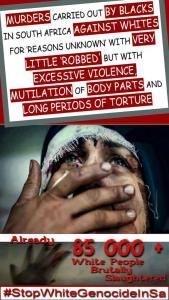 And what easier target for criminals, new and old, than people living on farms, relatively isolated from their neighbours, and far from the nearest police stations?
And what easier target for criminals, new and old, than people living on farms, relatively isolated from their neighbours, and far from the nearest police stations?
So yes, farmers probably did suffer more from the crime wave than other occupational groups, and because of the policies of the previous regime, most of the farmers who were worth robbing were white. Most of the black farmers had been deliberately dispossessed of their land and ethnically cleansed as a result of the apartheid policy.
But to call this “genocide” was simply racist political propaganda, and the government knew it, and perhaps for that very reason failed to take the problem seriously enough, and dismissed it as nothing more than propaganda. So the propagandists actually exacerbated the problem because they were more interested in making political capital out of the problem than in solving it. They actually thrived on it because it provided more “evidence” for their thesis that blacks were not fit to be in government. Just Google “white farm murders genocide” and see how they relish the blood and gore.
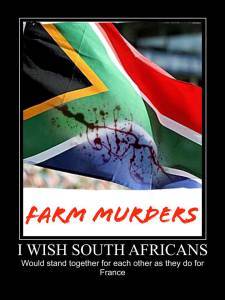 The other racist problem is that the “white genocide” conspiracy theorists use the term “farm murders” to refer to the murder of white farmers by black robbers. But quite a number of farm murders are the murder of black farm workers by their white employers. Those tend to get left out of the story, but they are still farm murders.
The other racist problem is that the “white genocide” conspiracy theorists use the term “farm murders” to refer to the murder of white farmers by black robbers. But quite a number of farm murders are the murder of black farm workers by their white employers. Those tend to get left out of the story, but they are still farm murders.
So my response to the genocide conspiracy theorists has been to say that “all lives matter”. Why single out just one occupational and ethnic group- for concern? People of all occupational and and ethnic groups suffered from the crime wave. The “genocide” theorists seemed to be more interested in promoting their political cause than fighting crime.
And then came Marikana.
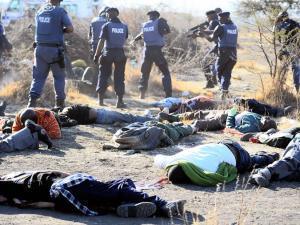 That showed that the “demilitarised” police force that was called a “police service” rather than a “force” was untransformed from the days when the police shot 69 unarmed protesters at Sharpeville in 1960. Transformation had failed. Farmers’ lives matter, but so do miners’ lives. But then we can also see that the number of policemen who have been murdered by criminals in the last couple of years far outnumbers the number of miners, and possibly the number of farmers as well. Why single out miners, when police and farmers are being murdered too?
That showed that the “demilitarised” police force that was called a “police service” rather than a “force” was untransformed from the days when the police shot 69 unarmed protesters at Sharpeville in 1960. Transformation had failed. Farmers’ lives matter, but so do miners’ lives. But then we can also see that the number of policemen who have been murdered by criminals in the last couple of years far outnumbers the number of miners, and possibly the number of farmers as well. Why single out miners, when police and farmers are being murdered too?
The difference is that the police and farmers are being murdered by criminals, while the miners are being murdered by the police. Nevertheless, rather than singling out a single occupational group for concern, it is better to say that all lives matter. . The #blacklivesmatter campaign in the USA is also about people who are being murdered by the police. who behave as if they do not believe that all lives matter. Believing that all lives matter is a matter of ubuntu.
Of course believing that all lives matter makes me pro-life, and the opposite of pro-life is pro-choice, that is, reserving the right to choose which lives matter and which don’t. There are some who believe that white farmers’ lives matter more than other lives, or that American lives matter more than Iraqi lives. There are those who choose to believe that black teenagers’ lives matter less than other lives, or that miners’ lives matter less than other lives, or that unborn lives matter less than other lives. But that’s another story, and I’ve told it here.


November 16, 2015
Sunday in Gauteng: Greek Liturgy, Romanian Temple, Turkish Mosque
There lots of different things to see in Gauteng, and people of many different cultures. Yesterday we had a busy day attending a Greek Liturgy, and visiting a Romanian Church and a Turkish Mosque, as well as calling on Val’s cousins from Namibia who were in town for a bicycle race.
We started off by fetching Fr Ciprian Burlacioiu, a Romanian priest teaching church history in a German university, now visiting South Africa to do research into migrancy and mission. He had visited once before, about five years ago, and was then doing research into the history of the African Orthodox Church.I touched briefly on the history of the African Orthodox Church in an article on Orthodox mission in tropical Africa, but Fr Ciprian has gone into it in much more detail, and his book is being published within the next couple of months. There is also more on his earlier visit here.
We fetched him at the Backpackers Lodge in Hatfield where he was staying (he stayed there on his previous visit too, so we might as well give them a plug) at 6:45 am, took our son Simon to work at Exclus1ve Books at Menlyn, and trundled down the byways (avoiding toll roads) to Saheti School Chapel in Senderwood, where Fr Razvan Tatu, a Romanian priest working in South Africa, had told us he was celebrating the Divine Liturgy.
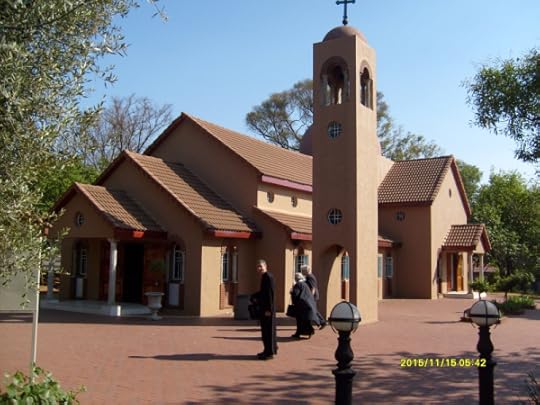
Saheti School Chapel
We had thought that the service would be in Romanian, but it turned out that Fr Razvan was standing in for Fr Petros Parginos, who was away. and so there followed a service in a mixture of Greek, Romanian and English. I contributed most of the English. I did try one small litany in Greek during Matins, when there were fewer people there, but chickened out for the last petition, which has lots of long words in it. I feared that hyperevlogimenis and mnemonevsantes would have me tongue-tied, so I switched back to English.

Saheti School Chapel, Senderwood, Johannesburg
The choir also sang some English hymns to familiar tunes, and and sang some newer Greek hymns, like Αγνή Παρθένε Δέσποινα, Άχραντε Θεοτόκε, quite magnificently (you can hear the hymn here, though it is sung by someone else).

Fr Ciprian Burlacioiu, Fr Razvan Tatu & Deacon Stephen Hayes at Saheti School Chapel, 15 November 2015
After the service at Saheti we went to Midrand to look at the Church of St Andrew, under construction and gradually nearing completion. It is being built by the Romanian community and the foundation stone was laid in January 2013.

St Andrew’s Church, Midrand, 15 Nov 2015. Through the west door one can see the Turkish Mosque on the hill opposite.
The church is quite small, but is on a big piece of ground, so there is plenty of room for expansion.

St Andrew’s Church, Midrand
On the hill opposite, to the west, can be seen the Turkish Mosque, said to be the largest in South Africa, if not in the southern hemisphere. The Romanians told us that since there were no toilets or places to get refreshments at the church site, they went to the mosque to make use of the facilities there.

Turkish Mosque in Midrand, as seen from the front door of the Romanian temple across the valley.
As it was a hot summer day (after a very hot fortnight, with record temperatures) we went there in search of refreshments. Fr Razvan said he usually took off his cassock when he went there, for fear of giving offence, but our previous bishop, Metropolitan Seraphim, had once chided clergy for not wearing cassocks when out on church business, and pointed out that Muslims were not afraid of wearing distinctive dress in public, and he encouraged the clergy to do so too. Many of the clergy then discovered that shop assistants and petrol-pump jockeys would greet them with Salaam Alikum. So we wore cassocks, and went to a cafe on the site. It was too hot for coffee, so we ordered lemon juice, and exhausted their supply.

View from the tea room at the Turkish mosque in Midrand. The Romanian temple is somewhere on the opposite hill, hidden among the trees. One might be able to see it with a telescope.
I was beginning to feel that this was quite nice. Here was a place where one could come to eat without feeling guilty about making Christians work on a Sunday. But then Val went inside and was immediately pounced on by the people there, who asked her who these people were, dressed a little bit like the Muslims who came there, only they had crosses. So she explained that we were Christians, and asked where they were from. One said he was Zimbabwean, and a Christian. A woman said she was a Maronite from Lebanon.

At the Turkish tea room in the grounds of the Midrand Mosque, with Ioan and Irene Andrei.
After exhausting the supply of lemon juice at the tea room we made inroads into their supply of baklava, and then went across to the mosque to have a look at it. The assistant Imam appeared and welcomed us, and told us a little about the project, which was inspired by one wealthy businessman, and a group of businessmen contributed to the project. They were building mosques and schools all over Africa and in other parts of the world, and had a school for 600 pupils on the premises, though at present they only had 400 pupils.

Midrand Mosque, built in the Ottoman style, and modelled on an original in Turkey
They also had a hostel for university students. They would come there first to memorise the Qur’an, and then would go on to study secular subjects at university, for which they were given scholarships. All this was paid for by this group of Turkish businessmen.

Detail of tiles at the Midrand mosque.
He said they were dedicated to spreading a message of love and peace all around the world.





